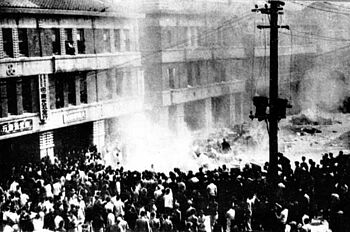Two visitors study documents in the former “Villa Oasis” prison, but many of the records on persecution in Taiwan continue to be inaccessible. The National Archives was first established in 2001 and 100 kilometers of documents are still waiting to be transferred. For a long time, the authorities refused to hand over papers that had been declared confidential. Historians are required to obtain the victim’s consent to view personal records about them. A transitional justice law went into effect in December 2017 that is supposed to change these conditions.
Credit: Hubertus Knabe
The Taiwan Transitional Justice Law

Credit: Hubertus Knabe
The names of many of the people who suffered political persecution are listed in close succession on the walls of this memorial on the former Green Island prisoner island. But only recently has Taiwan begun to more actively address the legacy of its past. A new “Law for the Promotion of Transitional Justice” led to the establishment of a commission that is meant to ensure that the events of the past be fully disclosed.
The law came into force in December 2017 and has significantly improved conditions for transitional justice. A nine-member committee is responsible for opening the archives and securing the locations where people were persecuted. Other tasks include rehabilitating unjustly convicted persons, researching historical events and promoting social reconciliation. The committee is also responsible for locating and restoring the illegally acquired Kuomintang party assets – which has caused heated debate in Taiwan. There is also considerable opposition to the removal of monuments from the period of martial law, as provided for in the law. Many of these monuments can still be found today in towns, schools, universities and other institutions.
To add teeth to the legislators’ intention, the law calls for severe penalties to those who obstruct its implementation. Institutions that refuse to hand over their records face fines of up to $166,000. Those who conceal or destroy records can be sentenced to up to five years in prison.
By 2019, 5,837 people convicted of political offences had been rehabilitated after examination by the Commission. That same year, Parliament also decided to lift the confidentiality status of all government documents pertaining to political persecution. Subsequently, the commission published several reports which proved the involvement of the secret police in events such as the Formosa Incident. In February 2020, the commission put online a database containing documents from 3,195 military court cases that took place during the martial law period.
Shortly after its creation in 2018, the commission was shaken by a scandal when its vice-president ordered investigations into a leading Kuomintang politician for campaign purposes. He was forced to resign after the matter became public.
Click here for the text of the Law on the Promotion of Transitional Justice (English).
Links
Website of the Commission for the Promotion of Transitional Justice (Chinese)
Website of the Taiwan National Archives
Past website of the Taiwan National Archives
After the Dictatorship. Instruments of Transitional Justice in Former Authoritarian Systems – An International Comparison
A project at the Department of Modern History at the University of Würzburg
Twitter: @afterdictatorship
Instagram: After the dictatorship
With financial support from the German Federal Ministry for Economic Cooperation and Development
Compensation Claims

Credit: Public domain
On February 28, 1947, an angry mob stormed the offices of the tobacco state monopoly in Taipei. Its employees had previously confiscated smuggled cigarettes from a street merchant. When the merchant protested, she was beaten with the butt of a rifle and shots were fired at people standing around. The incident triggered an uprising against the Kuomintang administration that was bloodily suppressed.
Almost half a century later, the Taiwanese parliament passed a compensation law. Victims of the “228 Incident” and their relatives are now entitled to up to 200,000 dollars in compensation. Hardly any other country pays victims of state persecution such high compensation.
The law came into force on April 7, 1995. By 2006, 2,264 compensation claims had been approved, 680 of which involved fatalities. A total of 9,420 people received compensation amounting to almost 240 million US dollars. Fifty more cases had been added by 2019. The foundation responsible for distribution was also given the task of researching and commemorating the events. It has been operating a national memorial in Taipei since 2007.
In 1998, another compensation law came into force, which guarantees for the first time that politically persecuted people have the right to claim compensation for later periods of military rule. It amounts to the equivalent of up to 20,000 US dollars per person. Relatives can even receive up to 77,000 US dollars for deceased people. A foundation is responsible for examining and paying out the compensation.
Finally, in 2000, the law on reparations for violations of individual rights during the period of martial law was passed. It ensures the removal of denied professional qualifications and pension rights of politically persecuted persons.
Click here for the text of the 228 Incident compensation law; here for the compensation act for wrongful trials during the martial law period; and here for the law on the recovery of damage of individual rights (all in English).